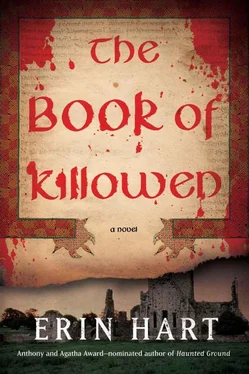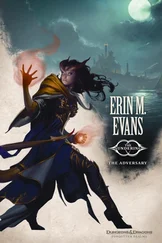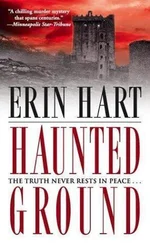“I’m here about a second body found in the boot of that car out on the bog.”
Gwynne didn’t look up, but the sheet of sandpaper in his hand stopped dead at the center of the vellum. After the briefest pause, it continued, making circles within circles.
Stella continued, “I’m trying to reconstruct the victim’s last known whereabouts, to find out what could have brought him to this part of the country.”
“And you think I might know what he was doing here?”
“You shared an interest in manuscripts, from what I understand. His name was Benedict Kavanagh. That name ring a bell?”
Martin Gwynne put down the sandpaper and ran his fingers across the calfskin again, like a blind man, feeling rather than looking, paying close attention to the sensations that passed through his fingertips. “I knew Kavanagh. We met once, long ago, at some conference or other. As you said, he studied old manuscripts, and he was sometimes known to consult with persons such as myself about some of the finer nuances of ink making or handwriting.”
A very carefully couched reply, Stella noted. “And did he happen to consult with a person such as yourself last April?”
“No, he didn’t. Now, as to whether he was on his way to see me, I couldn’t say. But we had no arrangement or appointment. He never came here to consult with me.”
Again, the way it was phrased, Kavanagh could have come to Killowen for some other reason than to consult Martin Gwynne. Was he being deliberately evasive?
“Had anyone mentioned him being in the area?”
“Not that I recall.” He began riffling through a jam jar full of white goose feathers, examining each shaft minutely before selecting the stoutest and cutting through it with his small, sharp knife, so that it was about ten inches in length, with a V-shape at the top. He got a firm grasp on one end of the V, and in a single swift motion stripped the lower barbs from the shaft. He repeated the motion on the other side, again leaving a few inches at the top of the quill.
“What do you recall about last April?”
Gwynne stopped to consider. “That’s the time for sowing leeks and onions. And Anthony—our neighbor, Anthony Beglan—was working on a new batch of calfskins for me. It might help if I just consult my diary.” He set down the half-made quill and crossed to the desk beside her. “I keep a note of deadlines and other important dates in here.” Quickly flipping back a few months, he found April and began looking down the entries. The small book was filled with a calligrapher’s careful hand, a rainbow of different-colored inks. He saw her taking in his handiwork. “If something is important enough to write down, it’s important enough to write properly. It’s a mark of respect for the person who will read what you’ve written.” Gwynne replied absently, repeating words he must have said a thousand times. “What sort of time frame are we talking about?”
“We only have a few details. Mr. Kavanagh taped his last television program on April twenty-first. We believe he might have come here shortly after.”
Martin Gwynne perused the entries in his book. “Well, we had the workmen in for the new heat, from April twentieth through the end of the month. No visiting artists during that time, with all the upheaval from the construction.” He paused to consult the diary once more. “What else? Ah, yes. I always prefer to work in daylight, but I had a commission due at the end of the month, quite a large piece, so I was working late. Burning a lot of midnight oil, as they say.”
“Are you the only person with a prior connection to Kavanagh?”
“I met him once, years ago, as I said. I’d hardly call that a connection.”
“To your knowledge, had any of the others here ever met Mr. Kavanagh?”
“Well, my wife would have met him at the same time I did, but I doubt she would remember. It’s twenty years ago.”
“And where was this?”
“At an academic conference in Toronto—a meeting of the Eriugena Society. A little-known group, medievalists and philosophers and paleographers. I believe Kavanagh was presenting a paper—I’m afraid I don’t remember the subject.”
“What was the name of the group?”
“The Eriugena Society.”
“Could you spell that for me?” She handed him her notebook.
“Medievalists, philosophers, and—sorry—what was the last group you mentioned?”
“Paleographers. Specialists in the study of ancient handwriting.”
“And what were you doing at the conference?”
“A colleague and I had just finished work on a late-ninth-century text, and the conference organizers thought it might be useful to have me give a talk about the process. I warned them that I wasn’t much at public speaking. How is all this relevant? I’ve really no idea what Kavanagh was doing here.”
“It’s possible that his visit to the area had something to do with his wife. I believe she’s stayed here a few times.”
Gwynne looked confused.
“Her name isn’t Kavanagh—it’s Broome. Mairéad Broome.”
A light dawned in his eyes. “Yes, of course, Mairéad. She’s often stayed with us.”
“And you’d no idea she was married to Benedict Kavanagh?”
“She never mentioned it. I suppose I thought—” He broke off suddenly, as if aware that he ought to be a bit more circumspect.
“What?” Stella asked. “That she was attached to her assistant, perhaps? Maybe I ought to mention that she’s here at Killowen now. She came down to identify her husband’s body. I believe she and Graham Healy will be staying on here for a few days.”
Gwynne looked slightly distracted. “Yes, better to be away from Dublin. The newspapers and the television can be merciless.”
Spoken like someone with firsthand experience, Stella thought. He looked up, and she understood that he would say no more today. “Thank you for your time, Mr. Gwynne. I wonder if you could point me to”—she consulted the handwritten list Claire Finnerty had made for her—“Lucien Picard.”
He stepped to the door and directed her across the far corner of the yard to a single-story whitewashed shed. “Ah, the French contingent. He’ll be in the cheese storehouse, and Sylvie with him. Never apart, those two.”
The rank scent of mold greeted Stella’s nostrils when she stepped through the door of the storehouse. “Lucien Picard?” A wiry, energetic-looking man in his midthirties looked up from his work as she entered. He was slicing through a thick wheel of cheese with an implement that looked like a knife with handles on both ends.
“C’est moi,” he said. “Sorry—that’s me. Try some of this? Six months aged.” He cut a thin wedge and popped it into her mouth before she could protest. “Very good, eh? To me, it is the best ever!”
Stella tasted the cheese on her tongue; it was perfectly tart and crumbly. She struggled to swallow. “Yes, very good, but I’m not here to… I have to ask you about Benedict Kavanagh.” She held up her identification. “The dead man found in the bog?”
His look of triumph vanished, replaced by seriousness. “Ah, yes, we heard about this. Do you need Sylvie as well? Sylvie!” A slightly younger woman emerged from the next room. Her short platinum hair was swathed in a turban-like pink headband, and beneath it strong features—large hazel eyes, a long, refined-looking nose, and generous lips—made a striking impression. Sylvie wore a blue peasant blouse and jeans, topped with a starched white chef’s apron. Resting on her shoulder was a four-foot plank that held two dozen or more petite creamy white cheeses.
“We have the police here, Sylvie, about the man in the bog—”
“Benedict Kavanagh,” Stella added.
Читать дальше












